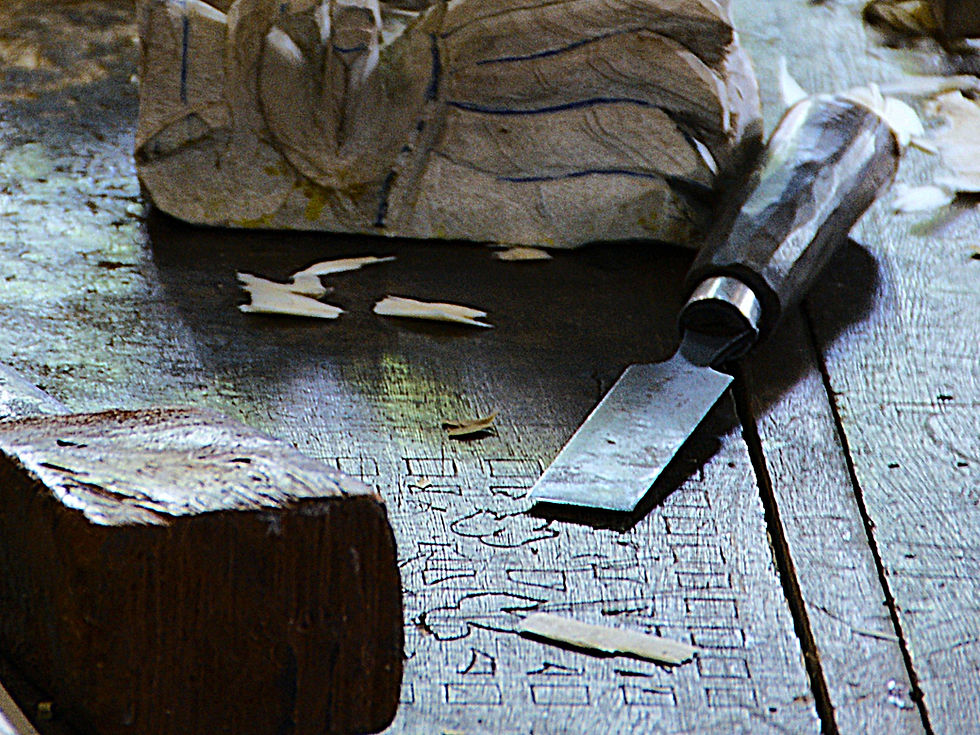When work is worship
- Shamalee de Silva Parizeau

- Aug 25
- 3 min read
A recipe for contentment revealed through an unintentional master
Growing up, the adult attitude toward work that surrounded me was that it was a tedious penalty for being financially able. Work was simply an exchange: money for energy. Unless you had a trust fund, it was a universal rule; you worked if you wanted to pay bills. No escape. I absorbed that culture and spent my early twenties preparing for careers that promised a nice paycheck at the end of the month, regardless of how I felt about the work itself. And I got one. It seemed simple enough until I encountered a simpler exchange that not only made life more bearable but also rendered it meaningful.

My first glimpse into how work and worship could be the same stream came through a master mask maker in Ambalangoda, Sri Lanka. What struck me first was how disgruntled he seemed to have customers. We had interrupted his work, which he clearly loved to immerse in. There seemed to be something greater in his craft than the prospect of money. When I asked why he chose to become a mask maker, he simply said he had taken to it after watching his uncle carve masks; the act called to him. There was no grand scheme or career strategy. It was pure interest. My questions about how he learned the craft or shaped his process seemed to puzzle him. “You just do it, there is nothing else to it,” he said.
The master was not a financially affluent man. He earned what he could from visitors buying masks, occasional commissions, and the odd state-sponsored grant or award. His workshop was simple, his clothes even simpler. He wasn’t working on a major commission, but he was carving another spectacular mask to exhibit at Shilpa, the state craft exhibition, the following year. Compared to Colombo’s ‘successful’ artists, he seemed uninterested in visibility, interviews, or recognition. What he carried instead was an air of rare contentment. He had neither great luxury nor widespread fame. Even I, writing about him some years later, can’t remember his name. But what does that matter?
Because I remember how the master was deeply immersed in his work. Its reception was of no great consequence to him. Its legacy was irrelevant. His masks were an act of devotion to the relationship he had with his surroundings, perhaps even with his materials. They arose from his curiosity towards an act and his compulsion to converse with it, on terms that were strictly his own. I couldn’t imagine a higher form of creative contentment. For him, work itself was worship.
The master was not interested in teaching me. But he did, nevertheless. He showed me that the gap we assume between work and worship is not natural. The two can be the same. And lives lived in that unity, I believe with good reason, are blessed with a rare sense of contentment.
Worship isn’t only in temples, churches, or mosques; it’s in the act of being deeply there for something. Worship is not a place, but a quality of presence. Worship isn’t in ritual alone, but in how we show up to the world. When someone is fully present in their task—whether sweeping a floor, weaving, coding, or painting—there is reverence in that presence.
I don’t know what became of the master mask maker. Perhaps he still shapes wood into faces with stories. Perhaps he died content in the act of doing so. Either way, he left me with an insight that shifted my own course. I stopped trying to fit into careers that looked good on paper and instead turned to the messy path of becoming a commercial creator to fund my personal creativity. When my son asks me what he should become when he grows up, I tell him to find where he naturally loses himself; to look for acts that draw him with curiosity, to immerse himself; to find worship in life.
Now, I know for certain that work is best as a form of worship. And more often than we realize, worship is the better exchange with the world; one that sustains meaning and pays the bills.


